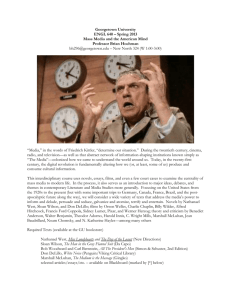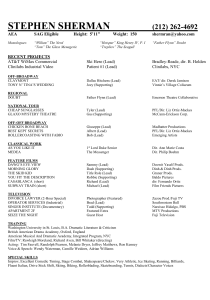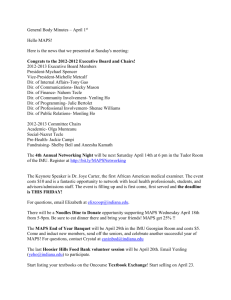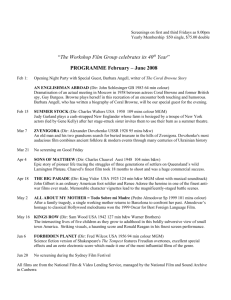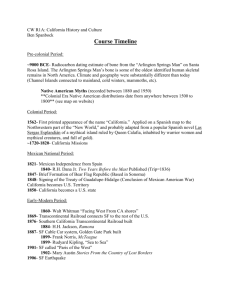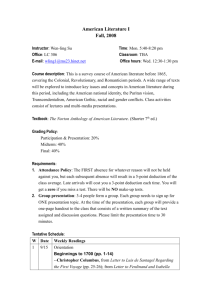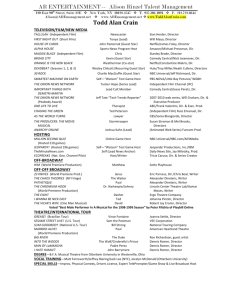Capstone: American Culture – “Mass Media
advertisement
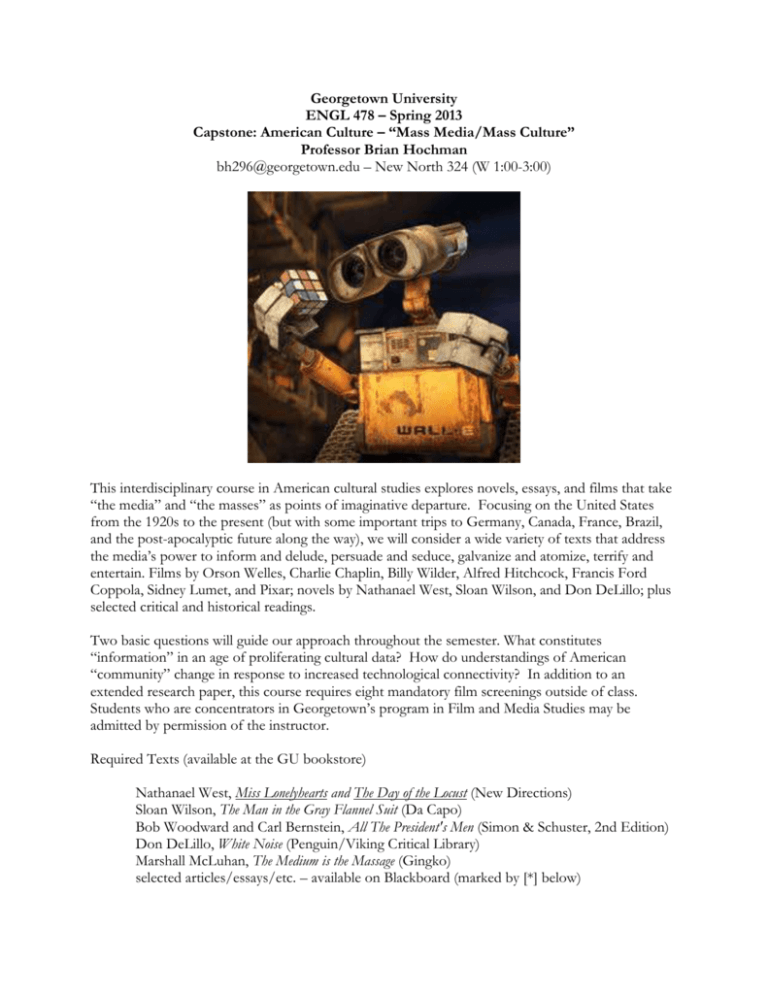
Georgetown University ENGL 478 – Spring 2013 Capstone: American Culture – “Mass Media/Mass Culture” Professor Brian Hochman bh296@georgetown.edu – New North 324 (W 1:00-3:00) This interdisciplinary course in American cultural studies explores novels, essays, and films that take “the media” and “the masses” as points of imaginative departure. Focusing on the United States from the 1920s to the present (but with some important trips to Germany, Canada, France, Brazil, and the post-apocalyptic future along the way), we will consider a wide variety of texts that address the media’s power to inform and delude, persuade and seduce, galvanize and atomize, terrify and entertain. Films by Orson Welles, Charlie Chaplin, Billy Wilder, Alfred Hitchcock, Francis Ford Coppola, Sidney Lumet, and Pixar; novels by Nathanael West, Sloan Wilson, and Don DeLillo; plus selected critical and historical readings. Two basic questions will guide our approach throughout the semester. What constitutes “information” in an age of proliferating cultural data? How do understandings of American “community” change in response to increased technological connectivity? In addition to an extended research paper, this course requires eight mandatory film screenings outside of class. Students who are concentrators in Georgetown’s program in Film and Media Studies may be admitted by permission of the instructor. Required Texts (available at the GU bookstore) Nathanael West, Miss Lonelyhearts and The Day of the Locust (New Directions) Sloan Wilson, The Man in the Gray Flannel Suit (Da Capo) Bob Woodward and Carl Bernstein, All The President's Men (Simon & Schuster, 2nd Edition) Don DeLillo, White Noise (Penguin/Viking Critical Library) Marshall McLuhan, The Medium is the Massage (Gingko) selected articles/essays/etc. – available on Blackboard (marked by [*] below) 2 Class Policies/Requirements Learning Goals: Pitched as an advanced capstone seminar for senior English majors, this course has four main objectives. Over the course of the semester students who take this class should expect . . . 1. to survey theories and fictions of mass media culture in the twentieth and twentyfirst centuries, with a special focus on the United States; 2. to gain a broad but disciplined understanding of the major themes, debates, and approaches that are central to the field of Literature and Media Studies in its present configuration; 3. to improve their ability to discern how cultural texts shape, and are shaped by, historical contexts; and 4. to produce a well-researched 12-15 page critical essay using a number of secondary sources. Please note: experience in the field of Film and Media Studies is not a prerequisite for this course. However, a cursory knowledge of the basic terms and techniques of visual analysis will likely prove helpful as we move forward. If you feel you need to brush up on the basics, I recommend consulting the handy Yale Film Analysis Web Site (http://classes.yale.edu/film-analysis/), or any edition of David Bordwell and Kristin Thompson’s Film Art: An Introduction. Grading and Requirements: 3 The majority of your grade for this course is determined by a series of assignments due at the end of the semester: a 5-6 page abstract (15%), and a 15-20 page final research paper (50%). The remainder of your grade hinges on a short analysis essay due in the middle of the semester (15%) and class participation (20%). (The latter category includes regular attendance, thoughtful contribution to class discussion, and your weekly “synthesis sentences”—more on this last requirement below). Since this course meets just once a week, regular attendance is crucial. Missing more than one or two sessions will seriously jeopardize your participation grade. If you miss more than three, you should reasonably expect to fail the course. General Expectations: 1. Turn in assignments on time. In all cases, late work is not acceptable. My policy is a simple one: for every day an assignment is late, I will deduct 1/3 of a letter grade. I may make exceptions in documented cases of personal or familial hardship (illnesses, family emergencies, etc.). But please take note: the pressures of other exams, papers, or extracurricular activities are not an acceptable excuse for lateness. Plan now to structure your time wisely—and please don’t hesitate to take advantage of my office hours (Wednesdays 1:00-3:00, and by email appointment) to help you work on assignments in advance of their due dates. 2. Attend all film screenings, which take place on Tuesday evenings (6:30-9:00) in the New South Film Studies Screening Room. This is an integral part of our class. The films on our syllabus both require and reward close attention and sustained engagement. With this in mind (and as a courtesy to your fellow classmates), please refrain from using laptops and smartphones in the New South theatre. I highly recommend bringing a notebook with you so that you can take notes during the screening and jot down your reflections immediately following it. If you’d like to refresh your memory before class, DVD copies of the films are available on reserve in the Gelardin New Media Center. (Many are also available on Netflix Instawatch.) 3. Come to class prepared not only to address all of the week’s assigned readings (this means printing them out and bringing them with you!), but to contribute to our conversation in thoughtful and accountable ways. In preparation for each class you will be asked to produce a series of “synthesis sentences”--one- or two-sentence summaries of each of the secondary readings for a given week (listed below under “contexts” and “critique”). These should attempt to capture the main thrust of each piece under consideration, but they cannot be longer than one or two sentences. Remember: this is an exercise in concision. Email your sentences to me by 8:30 PM on the Monday before our class meeting. I will then compile and distribute them for everyone to see. Writing Assignments: 1. Critical Essay: due Monday, March 25, 4-5 pages (typed, double-spaced, 12 point font). Your first assignment is to write a short paper that makes a substantive argument about a central theme, symbol, image, or problem in one of the primary texts on our syllabus. You may write on any topic that you wish. 2. Paper Abstract: due Monday, April 22, 3-4 pages (typed, double-spaced, 12-point font). In preparation for your final paper, you are expected to produce a 3-4 page essay abstract that clearly outlines your topic, your thesis, and a few potential points of comparison between the two texts you’ve chosen to consider. (For more on the final paper, see #3 below…) At the end of the 4 abstract, you should also list 5-6 secondary sources that you plan to consult in preparation for the paper. We’ll go over how to search for and use secondary sources in class; as always, though, I’m happy to suggest potential articles or books to peruse if you need help doing so. 3. Final Paper: due Monday, May 8, 12-15 pages (typed, double-spaced, 12-point font). Your work for this course will culminate in an extended critical essay that examines one or two of the texts on our syllabus. I’ll say more about the expectations for the abstract and the final paper as the semester progresses. In short, you may write on whatever topic that you wish, and whatever texts that you see fit—my only stipulations are that you meet with me to discuss your paper beforehand, and that you consult 5-6 secondary sources in preparation for the writing process. I’ll of course be available throughout the semester to help you hone your ideas, and to help you determine the best way to go about executing them. Plagiarism and Academic Honesty: The Georgetown University Honor Code—which includes a detailed definition of plagiarism—can be found on the GU website at http://gervaseprograms.georgetown.edu/honor/ system/53377.html. In short: Plagiarism is the act of passing off as one’s own the ideas or writings of another. While different academic disciplines have different modes for attributing credit, all recognize and value the contributions of individuals to the general corpus of knowledge and expertise. Students are responsible for educating themselves as to the proper mode of attributing credit in any course or field….[T]hree simple conventions are presented for when you must provide a reference: 1) If you use someone else's ideas, you should cite the source; 2) If the way in which you are using the source is unclear, make it clear; 3) If you received specific help from someone in writing the paper, acknowledge it….Faculty may use various methods to assess the originality of students' work. For example, faculty may submit a student's work to electronic search engines, including turnitin.com, a service to which the Honor Council and the Provost subscribe. Note that plagiarism can be said to have occurred without any affirmative showing that a student’s use of another’s work was intentional. I follow Georgetown’s guidelines for plagiarism. I also submit all student work to turnitin.com, an electronic search engine that detects instances of plagiarized writing. If you have any uncertainty about the meaning of plagiarism, please be sure to discuss it with me. 5 Schedule of Readings/Screenings/Assignments (subject to change in the course of the semester, if necessary) Jan. 15 Course Introduction 6:30-9:00 Screening: Citizen Kane (1941), dir. Orson Welles Jan. 22 The “Invention” of the Media text: Citizen Kane (1941), dir. Orson Welles context: Harold Innis, Empire and Communications (1950), 21-31 [*] Harold Innis, The Bias of Communication (1951), 33-60, 156-189 [*] critique: Raymond Williams, Keywords, 72-73, 203-204 [*] Benedict Anderson, Imagined Communities, 1-46 [*] 6 6:30-9:00 Screening: Triumph of the Will (1935, selections), dir. Leni Reifenstahl; The Great Dictator (1940), dir. Charles Chaplin Jan. 29 Media, Masses, Propaganda text: Triumph of the Will (1935), dir. Leni Riefenstahl The Great Dictator (1940), dir. Charles Chaplin context: Edward Bernays, Propaganda (1928), 1-61 [*] Walter Benjamin, “The Work of Art in the Age of Mechanical Reproduction” (1936) [*] Lazarsfeld and Merton, “Mass Communication, Popular Taste, and Social Action” (1948) [*] critique: Frank Scheide, “The Great Dictator and Chaplin’s Tramp” [*] Feb. 5 Adventures in the Culture Industry: Hollywood (I) text: Nathanael West, The Day of the Locust (1939) 6:30-9:00 Screening: Sunset Boulevard (1950), dir. Billy Wilder Feb. 12 Adventures in the Culture Industry: Hollywood (II) text: Sunset Boulevard (1950), dir. Billy Wilder context: Theodor Adorno and Max Horkheimer, “The Culture Industry” (1944) [*] André Bazin, “The Ontology of the Photographic Image” (1945), “The Myth of Total Cinema” (1946) [*] C. Wright Mills, “The Mass Society” (1956) [*] critique: 7 Morris Dickstein, “Sunset Boulevard” [*] Feb. 19 Conformity, Consumption, and Mass Society text: Sloan Wilson, The Man in the Gray Flannel Suit (1955) 6:30-9:00 Screening: The Manchurian Candidate (1962), dir. John Frankenheimer Feb. 26 The Extensions of Man text: The Manchurian Candidate (1962), dir. John Frankenheimer context: Marshall McLuhan, Understanding Media (1964), 3-32 [*] Marshall McLuhan, The Medium is the Massage (1967) Mar. 12 Watchdogs and Whistleblowers text: Bob Woodward and Carl Bernstein, All The President's Men (1974) 6:30-9:00 Screening: The Conversation (1974), dir. Francis Ford Coppola Mar. 19 Sound and Sense text: The Conversation (1974), dir. Francis Ford Coppola context: R. Murray Shafer, The Soundscape (1977), 3-12, 88-99 [*] Michel Chion, The Voice in Cinema (1982), 1-29 [*] Friedrich Kittler, Gramophone, Film, Typewriter (1986), 1-19 [*] critique: 8 Dennis Turner, “The Subject of the Conversation” [*] 6:30-9:00 Screening: Vertigo (1958), dir. Alfred Hitchcock Mar. 25 4-5 PAGE VISUAL ANALYSIS DUE Mar. 26 Special Case Study: Alfred Hitchcock text: Vertigo (1958), dir. Alfred Hitchcock critique: Laura Mulvey, “Visual Pleasure and Narrative Cinema” (1975) [*] Lecture (Time TBA): Laura Mulvey, “Hitchcock’s Blondes” Apr. 2 Box Populi (I) text: Network (1976), dir. Sidney Lumet context: Raymond Williams, Television (1974), 1-25, 121-138 [*] Jean Baudrillard, Simulacra and Simulation (1981), 1-42 [*] Herman and Chomsky, Manufacturing Consent (1988), 1-86, 297-308, xi-xix [*] Apr. 9 Box Populi (II) text: Don DeLillo, White Noise (1985) 6:30-9:00 Screening: Wall-E (2008), dir. Andrew Stanton Apr. 16 “New” Media text: 9 Wall-E (2008), dir. Andrew Stanton context: Jay David Bolter and Richard Grusin, Remediation (1999), 2-40 [*] Lev Manovich, The Language of New Media (2001), 19-61 [*] D.N. Rodowick, The Virtual Life of Film (2007), 1-31 [*] critique: Vivian Sobchack, “Animation and Automation” [*] 6:30-9:00 Screening: Cave of Forgotten Dreams (2011), dir. Werner Herzog Apr. 22 3-4 PAGE ABSTRACT DUE Apr. 23 Course Wrap-Up: Media Archaeologies text: Cave of Forgotten Dreams (2011), dir. Werner Herzog May 8 12-15 PAGE FINAL PAPER DUE
